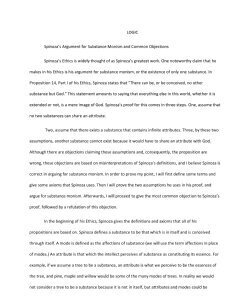LOGIC Spinoza’s Argument for Substance Monism and Common Objections Spinoza’s Ethics is widely thought of as Spinoza’s greatest work. One noteworthy claim that he makes in his Ethics is his argument
LOGIC Spinoza’s Argument for Substance Monism and Common Objections Spinoza’s Ethics is widely thought of as Spinoza’s greatest work. One noteworthy claim that he makes in his Ethics is his argument
LOGIC
Spinoza’s Argument for Substance Monism and Common Objections
Spinoza’s Ethics is widely thought of as Spinoza’s greatest work. One noteworthy claim that he makes in his Ethics is his argument for substance monism, or the existence of only one substance. In Proposition 14, Part I of his Ethics, Spinoza states that “There can be, or be conceived, no other substance but God.” This statement amounts to saying that everything else in this world, whether it is extended or not, is a mere image of God. Spinoza’s proof for this comes in three steps. One, assume that no two substances can share an attribute.
Two, assume that there exists a substance that contains infinite attributes. Three, by these two assumptions, another substance cannot exist because it would have to share an attribute with God. Although there are objections claiming these assumptions and, consequently, the proposition are wrong, these objections are based on misinterpretations of Spinoza’s definitions, and I believe Spinoza is correct in arguing for substance monism. In order to prove my point, I will first define some terms and give some axioms that Spinoza uses. Then I will prove the two assumptions he uses in his proof, and argue for substance monism. Afterwards, I will proceed to give the most common objection to Spinoza’s proof, followed by a refutation of this objection.
